BuySellBA
Administrator
What's new in the property market: the method that allows you to buy with US$100 and sell in 10 minutes - La Nacion Propiedades

Source:

 www.lanacion.com.ar
www.lanacion.com.ar
April 25, 2025
Technological progress knows no bounds and transforms everything in its path; real estate today is part of that revolution.
April 24, 2025
By Maria Josefina Lanzi
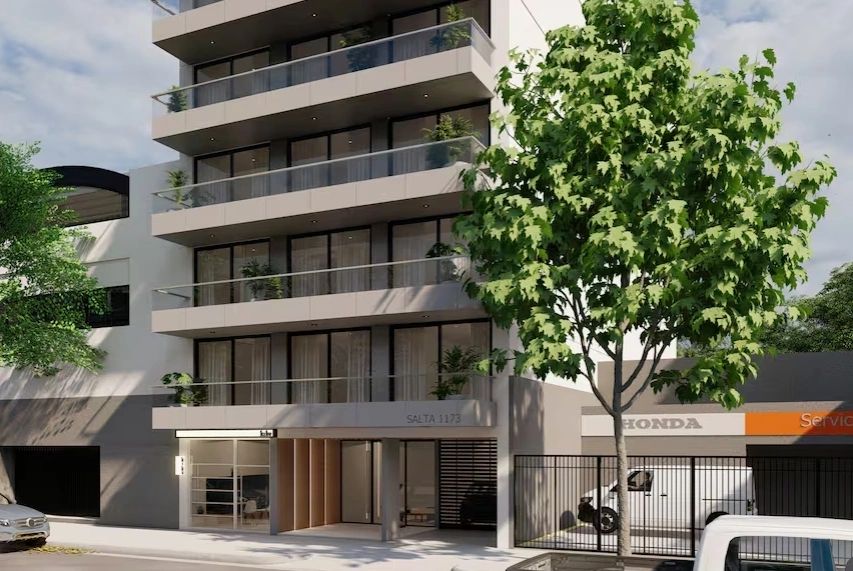
The tool that allows you to sell apartments in less than ten minutesR3AL BLOCKS
Technology is advancing by leaps and bounds and, little by little, is taking off in the investment world. Amidst this revolution, tokenization is part of a silent, yet revolutionary, transformation with no turning back. In fact, it allows you to participate in a real estate project with just US$100—something unthinkable in the real estate world. Not only that, but it exponentially accelerates sales: there are specific cases in which an apartment sold in less than 10 minutes.
Facundo's experience better reflects the dynamics of this technology. He's 23 years old and a year ago decided to enter the world of digital investments, to "get money out from under the mattress and allocate it to an asset," he reveals. He's a university student and started working some time ago. He decided to invest part of what he'd managed to save in recent years (US$500) in real estate, more specifically, in digital tokens from the R3al Blocks platform, for a building located in the Monserrat neighborhood. "The whole process was very easy; I went to the website and in two minutes I was able to register and buy. Now I'm participating in a condominium —five fractions of an apartment—which will give me a 15% annual return, a result of the appreciation of the square meter once the property is sold ," the young man shares.
Pedro, 55, also became interested in the world of tokenization: “I invested my savings. I knew this technology was going to reach real estate and will soon be in the automotive world.” He also explains that, unlike traditional real estate investments , he can come and go as he pleases. “Buying a property isn't easy, but with this model, you can navigate it easily, and if I want, I can go and see the projects because I'm investing in something tangible that exists.”
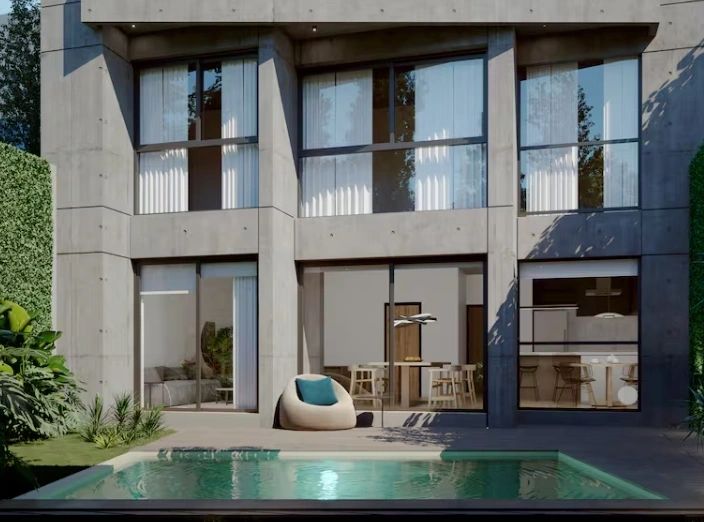
Tokenization allows for the sale of ventures that do not yet exist, with investors entering with only US$100.Blockchain Shovel

The tokenization market is estimated to reach US$600 billion by 2023 and is expected to grow 26 times in size by 2030.Blockchain Shovel
Little by little, stories like these are being replicated, but it's worth asking: what does tokenization mean? To put it simply, it consists of dividing an apartment "into parts" and representing that fraction of the asset on "digital paper"—better known as a token . This is recorded on a blockchain , a type of digital network, but unlike conventional databases, it is decentralized and immutable, meaning it cannot be altered or controlled by a single entity.
In other words, when we talk about tokenization, what we do is digitally represent a real-world asset, within the blockchain , a network that has no intermediaries and that has certain advantages, ranging from the possibility of fragmenting the asset and having several people participate in the cash flows it generates, to having greater liquidity in markets that are illiquid (because the token can be bought and sold at any time).
This technology is already being used in a wide variety of business models: from purchasing soccer player tokens to investing in agriculture, energy, or art. In the case of real estate, what is tokenized is not the property itself, but a legal document that supports its ownership (such as a trust or a bill of sale). This document is divided into fractions, and each token represents a personal right: it can be the use of the property, a percentage of the income it generates, or a portion of the value of a future sale. In other words, whoever buys tokens shares in the profits generated by the asset, depending on their percentage.
“Developers, especially from within the country, are contacting us to tokenize real estate projects,” shares Pedro Nicholson, a real estate lawyer at Estudio Béccar Varela, who is also part of the Metro Futuro team. “A business climate is emerging that didn't exist before. They came to us from Brazil, where they've been tokenizing for six years.”
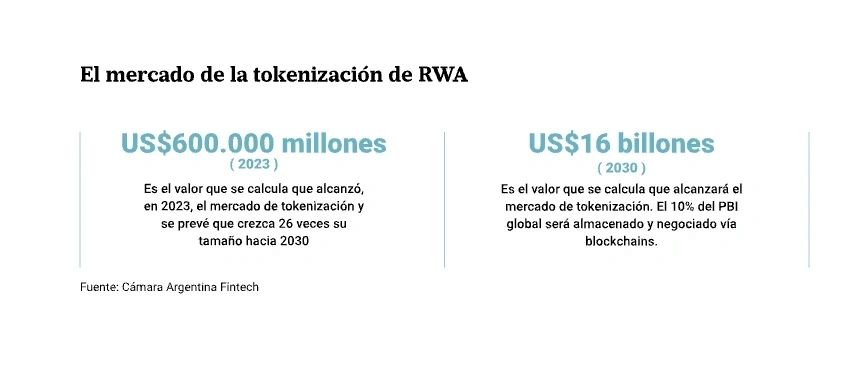
In numbers, according to data from the Argentine Fintech Chamber, various studies affirm that the tokenization of RWA (which stands for Real World Assets) will be a US$16 trillion market by the end of the decade , and that 10% of global GDP will be stored and traded via blockchains. It is estimated that, by 2023, the tokenization market will reach US$600 billion and is expected to grow 26 times its size by 2030.
"The idea is that in the future, tokens will be used to guarantee a rental, a personal loan, or a mortgage. We fully believe this will move the needle," shares Juan Porrazzo, partner at Metro Futuro, an Argentine company that began tokenizing real estate assets in Spain in 2021 and launched in Argentina at the end of 2024.
“Tokenization allows people to invest from anywhere in the world, diversifying their investments,” said Eric Sánchez, CEO of Reental, a Spanish company founded in 2021 that has already tokenized 79 real estate projects totaling US$56 million and a community of more than 21,000 users from 85 countries. Furthermore, Argentine Luis Scola, former player of the Argentine basketball team's golden generation, is one of its ambassadors . “It's something that's not only reaching small investors but also larger developers, like Blackrock, because the value of this technology facilitates processes,” adds Sánchez, who details that last year Reental had a 13.10% return on investment on its tokenized projects.
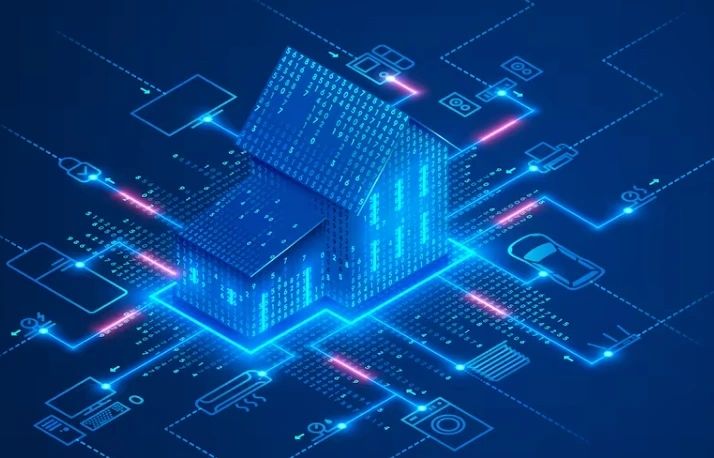
Tokenization democratizes real estate investmentShutterstock - Shutterstock
“This tool made it possible to generate access to real estate investment for an audience that viewed it as completely distant ,” Porrazzo shares, adding that Metro Futuro was the first company in the Argentine real estate market to be accepted by the Fintech Chamber. “Our arrival in our country was planned for later, but the change in government accelerated our plans,” reveals Mariela Schenone, CEO of Metro Futuro, the company that started in Europe, acquiring properties at low prices, which they then recycled and tokenized to sell to various interested parties. They handle rental management, and those who acquired tokens earn from the cash flow generated.
Débora Carrizo, cofounder and CEO of R3al Blocks, a startup that uses blockchain technology to transform real-world assets into digital tokens, explains that it's a tool that allows her to bring bricks and mortar to the middle class. "I always considered technology a tool to pave the way and create equality," adds Carrizo, revealing that she was born into a working-class family, studied engineering, and is a "rebel." She is currently Head of Technology at Women of Web3 for the United Nations and explains that Real Blocks is her fourth technological venture, with which she seeks to generate significant impact.
Carrizo points out that, through his venture, he's marketing a building under construction in the Monserrat neighborhood. "Unit tickets start at US$54,800, but thanks to tokenization, you can invest in a fraction starting at US$100," he explains.
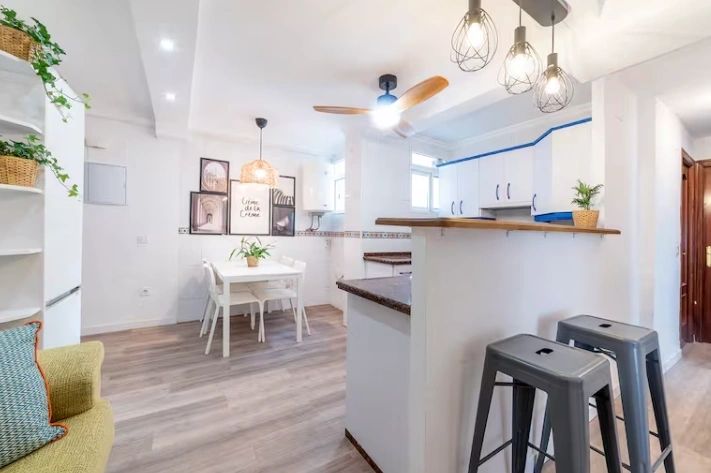
Tokenization: A renovated Spanish property is tokenized and offered for rent.Future Metro
“Having a purchase agreement for a fraction of a property and then being able to transfer it at any time allows for liquidity in a sector that traditionally hasn't been,” adds Vigliano of Pala Blockchain, who also adds that assets from different countries can be tokenized. The entrepreneur is tokenizing a hotel project in which one can purchase a share of a hotel room, represented by a token, “which can be used or transferred as many times as the owners of that token want to.” Once the project is completed, they earn from the difference generated when selling the property, or they can acquire a token from the hotel's management trust and receive the cash flows generated by the hotel. The profit depends on each asset and its market value.
Today, this is achieved by tokenizing the trust that the developer creates when starting a real estate project. “The trust is given the ability to manage the property and is tokenized; this way, we can market fractions of the apartment. The token is 'the receipt' that shows the investor is part of that trust,” explains Manuel Arias, cofounder and CFO of R3al Blocks. He adds: “Today, the legal structure for achieving tokenization is the one proposed by Arias, although the CNV, the Fintech Chamber, and the UIF are working toward a tokenization law .”
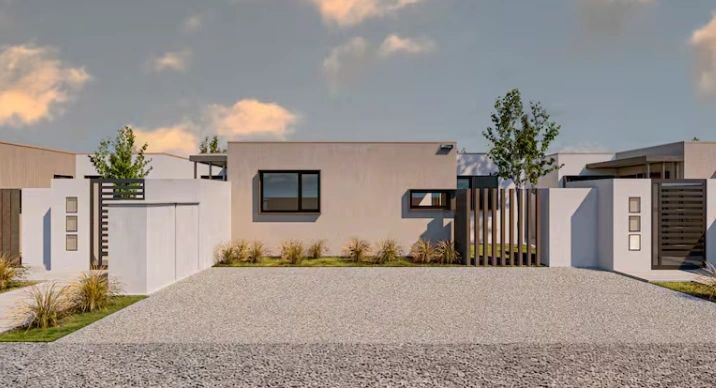
Properties to be tokenized in Vaca Muerta Blockchain Shovel
One fact that reflects the paradigm shift brought about by the model is that it's possible to sell real estate projects in 10 minutes. Beccar Varela's lawyer, Nicholson, states this and clarifies that this is a phenomenon already occurring in some startups in Spain: "When you manage to generate a community of tokenists, who already know the company that typically tokenizes real estate projects, it's possible to sell properties in 10 minutes, as they quickly access new investments that arise."
Furthermore, the information is represented through an uneditable code, which provides greater security to the tool. “It is cryptographically protected: thanks to the encryption, you are sure that it travels safely, without anyone being able to modify it. In the case of Pala Blockchain, the key lies in how the physical world connects with the digital world: a notary acts as an oracle, validating that each token from its creation effectively represents a personal right backed by a contract,” concludes Vigliano of Pala Blockchain.
www.buysellba.com

Source:

Lo nuevo en el mercado de propiedades: el método que permite comprar con US$100 y vender en 10 minutos
El progreso tecnológico no conoce límites y transforma todo lo que encuentra en su camino; el real estate hoy es parte de esa revolución
April 25, 2025
Technological progress knows no bounds and transforms everything in its path; real estate today is part of that revolution.
April 24, 2025
By Maria Josefina Lanzi

The tool that allows you to sell apartments in less than ten minutesR3AL BLOCKS
Technology is advancing by leaps and bounds and, little by little, is taking off in the investment world. Amidst this revolution, tokenization is part of a silent, yet revolutionary, transformation with no turning back. In fact, it allows you to participate in a real estate project with just US$100—something unthinkable in the real estate world. Not only that, but it exponentially accelerates sales: there are specific cases in which an apartment sold in less than 10 minutes.
Facundo's experience better reflects the dynamics of this technology. He's 23 years old and a year ago decided to enter the world of digital investments, to "get money out from under the mattress and allocate it to an asset," he reveals. He's a university student and started working some time ago. He decided to invest part of what he'd managed to save in recent years (US$500) in real estate, more specifically, in digital tokens from the R3al Blocks platform, for a building located in the Monserrat neighborhood. "The whole process was very easy; I went to the website and in two minutes I was able to register and buy. Now I'm participating in a condominium —five fractions of an apartment—which will give me a 15% annual return, a result of the appreciation of the square meter once the property is sold ," the young man shares.
Pedro, 55, also became interested in the world of tokenization: “I invested my savings. I knew this technology was going to reach real estate and will soon be in the automotive world.” He also explains that, unlike traditional real estate investments , he can come and go as he pleases. “Buying a property isn't easy, but with this model, you can navigate it easily, and if I want, I can go and see the projects because I'm investing in something tangible that exists.”

Tokenization allows for the sale of ventures that do not yet exist, with investors entering with only US$100.Blockchain Shovel

The tokenization market is estimated to reach US$600 billion by 2023 and is expected to grow 26 times in size by 2030.Blockchain Shovel
Little by little, stories like these are being replicated, but it's worth asking: what does tokenization mean? To put it simply, it consists of dividing an apartment "into parts" and representing that fraction of the asset on "digital paper"—better known as a token . This is recorded on a blockchain , a type of digital network, but unlike conventional databases, it is decentralized and immutable, meaning it cannot be altered or controlled by a single entity.
In other words, when we talk about tokenization, what we do is digitally represent a real-world asset, within the blockchain , a network that has no intermediaries and that has certain advantages, ranging from the possibility of fragmenting the asset and having several people participate in the cash flows it generates, to having greater liquidity in markets that are illiquid (because the token can be bought and sold at any time).
This technology is already being used in a wide variety of business models: from purchasing soccer player tokens to investing in agriculture, energy, or art. In the case of real estate, what is tokenized is not the property itself, but a legal document that supports its ownership (such as a trust or a bill of sale). This document is divided into fractions, and each token represents a personal right: it can be the use of the property, a percentage of the income it generates, or a portion of the value of a future sale. In other words, whoever buys tokens shares in the profits generated by the asset, depending on their percentage.
“Developers, especially from within the country, are contacting us to tokenize real estate projects,” shares Pedro Nicholson, a real estate lawyer at Estudio Béccar Varela, who is also part of the Metro Futuro team. “A business climate is emerging that didn't exist before. They came to us from Brazil, where they've been tokenizing for six years.”
Future prospects
“2025 is going to be the year of tokenization. Everything will be tokenized, from real estate to agricultural contracts,” shares Rodolfo Vigliano, co-founder and CEO of Pala Blockchain, a technology company working to develop platforms for real estate entrepreneurs and other industries to sell their products in tokenized form. They recently presented their model, known as tokenization by containers on blockchain, at the World Economic Forum in Davos: “Our tokens act as 'containers' that can hold different types of documents, such as a bill of sale, allowing for easy and secure trading, similar to a digital currency, but with the advantage of being documents signed by notaries.”
In numbers, according to data from the Argentine Fintech Chamber, various studies affirm that the tokenization of RWA (which stands for Real World Assets) will be a US$16 trillion market by the end of the decade , and that 10% of global GDP will be stored and traded via blockchains. It is estimated that, by 2023, the tokenization market will reach US$600 billion and is expected to grow 26 times its size by 2030.
"The idea is that in the future, tokens will be used to guarantee a rental, a personal loan, or a mortgage. We fully believe this will move the needle," shares Juan Porrazzo, partner at Metro Futuro, an Argentine company that began tokenizing real estate assets in Spain in 2021 and launched in Argentina at the end of 2024.
“Tokenization allows people to invest from anywhere in the world, diversifying their investments,” said Eric Sánchez, CEO of Reental, a Spanish company founded in 2021 that has already tokenized 79 real estate projects totaling US$56 million and a community of more than 21,000 users from 85 countries. Furthermore, Argentine Luis Scola, former player of the Argentine basketball team's golden generation, is one of its ambassadors . “It's something that's not only reaching small investors but also larger developers, like Blackrock, because the value of this technology facilitates processes,” adds Sánchez, who details that last year Reental had a 13.10% return on investment on its tokenized projects.
What are the advantages of this technology?
“We bring real estate investment to the middle class”
Regarding the advantages of this technology, still unknown to most people, the sources consulted highlight the democratization of investment. Real estate has historically served as a safe haven for Argentines, but it is a market in which entry fees are high. It is difficult for someone without at least US$50,000 to invest in a property. With tokenization, by digitally representing a real estate asset, it is possible to fragment it into several parts and reach a larger number of investors, who enter this business with small sums of money , which can start as low as US$100 .
Tokenization democratizes real estate investmentShutterstock - Shutterstock
“This tool made it possible to generate access to real estate investment for an audience that viewed it as completely distant ,” Porrazzo shares, adding that Metro Futuro was the first company in the Argentine real estate market to be accepted by the Fintech Chamber. “Our arrival in our country was planned for later, but the change in government accelerated our plans,” reveals Mariela Schenone, CEO of Metro Futuro, the company that started in Europe, acquiring properties at low prices, which they then recycled and tokenized to sell to various interested parties. They handle rental management, and those who acquired tokens earn from the cash flow generated.
Débora Carrizo, cofounder and CEO of R3al Blocks, a startup that uses blockchain technology to transform real-world assets into digital tokens, explains that it's a tool that allows her to bring bricks and mortar to the middle class. "I always considered technology a tool to pave the way and create equality," adds Carrizo, revealing that she was born into a working-class family, studied engineering, and is a "rebel." She is currently Head of Technology at Women of Web3 for the United Nations and explains that Real Blocks is her fourth technological venture, with which she seeks to generate significant impact.
Carrizo points out that, through his venture, he's marketing a building under construction in the Monserrat neighborhood. "Unit tickets start at US$54,800, but thanks to tokenization, you can invest in a fraction starting at US$100," he explains.
“We sell properties in 10 minutes”
Selling a property isn't easy. Mainly because it's an asset that can start at US$50,000 and reach a value of half a million dollars, so it's not a decision that's made overnight. However, tokenization has brought liquidity to a traditionally illiquid industry, as properties tokenized on the blockchain are divided into amounts that can be very small and transferred to a third party at virtually any time.
Tokenization: A renovated Spanish property is tokenized and offered for rent.Future Metro
“Having a purchase agreement for a fraction of a property and then being able to transfer it at any time allows for liquidity in a sector that traditionally hasn't been,” adds Vigliano of Pala Blockchain, who also adds that assets from different countries can be tokenized. The entrepreneur is tokenizing a hotel project in which one can purchase a share of a hotel room, represented by a token, “which can be used or transferred as many times as the owners of that token want to.” Once the project is completed, they earn from the difference generated when selling the property, or they can acquire a token from the hotel's management trust and receive the cash flows generated by the hotel. The profit depends on each asset and its market value.
And the developers?
Another advantage this technology offers is related to financing for developers. Tokenization could allow real estate developers to reach a broader universe of potential investors for their projects , since they could invest in real estate developments for small amounts. This results in a win-win situation, as the person purchasing tokens makes a real estate investment, and the developer can access funds to move forward with the project.Today, this is achieved by tokenizing the trust that the developer creates when starting a real estate project. “The trust is given the ability to manage the property and is tokenized; this way, we can market fractions of the apartment. The token is 'the receipt' that shows the investor is part of that trust,” explains Manuel Arias, cofounder and CFO of R3al Blocks. He adds: “Today, the legal structure for achieving tokenization is the one proposed by Arias, although the CNV, the Fintech Chamber, and the UIF are working toward a tokenization law .”

Properties to be tokenized in Vaca Muerta Blockchain Shovel
One fact that reflects the paradigm shift brought about by the model is that it's possible to sell real estate projects in 10 minutes. Beccar Varela's lawyer, Nicholson, states this and clarifies that this is a phenomenon already occurring in some startups in Spain: "When you manage to generate a community of tokenists, who already know the company that typically tokenizes real estate projects, it's possible to sell properties in 10 minutes, as they quickly access new investments that arise."
But is it safe?
The sources consulted clarify that, once the assets are tokenized, they are hosted within a blockchain, a network where information is encoded and where there are no intermediaries, as it is decentralized. "Tokens allow us to represent value and divide it into as small parts as we want, transferring it without the need for someone in the middle, as is the case with the internet," explains Carrizo.Furthermore, the information is represented through an uneditable code, which provides greater security to the tool. “It is cryptographically protected: thanks to the encryption, you are sure that it travels safely, without anyone being able to modify it. In the case of Pala Blockchain, the key lies in how the physical world connects with the digital world: a notary acts as an oracle, validating that each token from its creation effectively represents a personal right backed by a contract,” concludes Vigliano of Pala Blockchain.
www.buysellba.com

